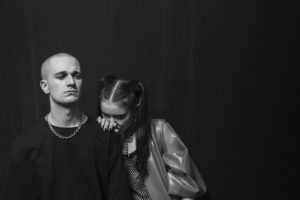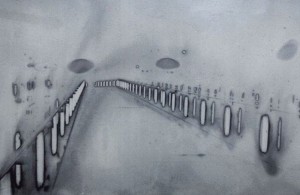There’s a running joke in the noise scene that people pretend to love Merzbow, but only few listen to his releases. It would seem that many are more concerned with looking like fans than actually listening to Masama Akita’s work. Agnes Gryczkowska and Alexander Johnston of NAKED are those ones that actually do. As a matter of fact, they were on the bill with the Japanese noise icon this week at London’s St. John at Hackney, where they debuted new material from their first full-length album Zone, out on Hudson Mohawke’s LuckyMe label on September 30. The Edinburgh duo —now based in London and speaking to me via FaceTime from Agnes’s bedroom —mention Merzbow as a fundamental source of inspiration, along with other favourites including Posh Isolation’s Loke Rahbek and Pan Sonic’s Mika Vainio. Yet, with an interest in eclectic sound, NAKED don’t want to be perceived as members of any particular scene. They’re just as likely to produce a 360° video with progressive art and fashion platform Primitive London as they are to spring a production credit for New York avant-rapper Mykki Blanco’s ‘Moshin’ In The Front’.
NAKED’s new album is the follow-up to their 2015 EP Youth Mode, appearing on the same label but reflecting a vast transition in their emotional lives. The duo’s first release offered comfort and consolation, hidden in innocent ballads like ‘Void’ and ‘Voyeur’. The LP to follow attacks with anxiety and fear. NAKED have torn down what they had built with their earlier music, firmly shifting towards power electronics and noise. Zone is both humid and electrified, with its tense arrangements and stone-cold beats owning its listener’s ears like a malfunctioning power circuit. Gryczkowska augments this terror with her manic Grimes-like vocals in a sound overseen by valued engineer Paul Corley, known for his work with the likes of Ben Frost and Oneohtrix Point Never.
Of Scottish and Polish heritage respectively, Johnston and Gryczkowska met in Edinburgh where they moved in similar crowds, bringing the latter’s teen days singing in church choirs in Krakow with the former’s penchant for distorting sounds and replacing them with their uglier, angrier versions. Now gracing Zone with emotive singing, strongly influenced by a passion for opera, Gryczkowska enthuses over Scotland as “the new heaven on Earth” after England elected to leave the European Union, “Literally everyone’s coming here. It’s going to be the best country post-Brexit”, she says. Musically, the evolution of NAKED seems to reflect this fresh uncertainty, from innocence to disillusionment.

Your previous record seemed delicate and ethereal whereas Zone is very noisy, raw and direct. How do you see yourself now as compared to the spring of 2015 when you released the Youth Mode EP?
Agnes Gryczkowska: I guess back then we still had an element of hope and, as you said, it was ethereal and we created our own dreamscape to some extent.
Alexander Johnston: We were a bit younger. They’re both a connection of happiness and sadness but back then we had more positivity. Now that we’ve grown up and experienced life a bit more, it doesn’t feel so much like that. [sighs]
AG: With the album it was the feeling of the time, everything we were taking in from our environments, with the idea of making it very uncompromising and confronting, much more violent. We’ve been wanting to bring it out in a direction that is more brutal and noise-orientated. At the same time, we wanted to keep elements of the sweet and fragile but they’re not hopeful anymore. The vocal side is like grasping to the ruins of humanity. It’s a metaphor for survival, it’s very primitive. It’s a bit tricky because we lost sense of what’s listenable. We started thinking if you can actually listen to this as we played it to our friends and they were like, ‘Fucking hell’. [laughs]
Was this change more about you or the world around us?
AG: I guess, both.
AJ: Definitely our personal experiences, but we feel that they’re not going to be that dissimilar to a lot of people’s personal experiences and for that reason I feel there is a universality in there.
AG: Yeah, that’s an element we always wanted to bring out as well. In interviews we have been always quite hesitant to talk about our background and who we are as people but more about what we’re trying to say. You get tonnes of interviews with people saying: ‘I’m this type of person. I’m that type of person’, speaking about their background and their families. It’s quite interesting but it becomes this weird attention-seeking thing and we want to do something more universal. With us playing live it’s us performing, it’s people essentially coming to see us and what we’ve been doing. It’s this very physical experience so that people can actually feel certain things, not only necessarily through sounds but other aspects too.
AJ: We’re quite conscious of the structure of sounds. They are structured within this universal context in mind. The sound we use can be at times very distorted, brutal and violent but there’s still something universal to it and it’s conscious.
From what I understand, you don’t want your music to be about you but what you’re channeling — a certain zeitgeist, ‘feels’ of the world?
AJ: It’s not even about channeling, that’s simply what’s going to happen. I don’t see myself as anything special. I’m just a normal person experiencing pretty normal stuff.
AG: It’s interesting to be in a position where people actually want to hear what you’ve got to say, to hear your music. We try to calculate it very well so we’re not just making this about ourselves but using the position we’re in to say something. I guess our selection in terms of sounds and visuals is a package of the things that underline what we want to say with our music. And it can be quite difficult.
AJ: It’s not difficult. Don’t say it’s difficult.
AG: I mean, either you get it or you don’t get it. It’s almost like we’re creating a zone for ourselves and for other people and if they want to become a part of it, then we obviously want as many people to become a part of it. But at the same time, it’s that they’re inside or outside. We don’t want the people to be in-between.
Alex, you started protesting when Agnes said it’s difficult.
AJ: I don’t think using noise and distortion are difficult.
AG: I’m not saying it’s difficult but obviously it’s something negative and the nature of it is not wanted, out of order and not very pleasant. Historically, that’s not something acceptable but it becomes a subjective thing, dependent on your personal approach. We can listen to stuff that’s super noisy and we’re like ‘Yeah!’ but some of my friends can’t endure it at all. That’s why I think it can be difficult for some people.
AJ: In films or novels you can watch someone acting extremely violently and it’s widely accepted and for some reason in music, as soon as there’s something that may be ugly or violent, unpleasant, people will instantly switch it off. It’s weird.
Maybe people find music more personal than films?
AJ: There are loads of people who listen to noise because they find something in it. I find it much more realistic, it’s not always optimistic. That’s why I relate to it.
AG: Well, our album, the name and everything – they have this physical and bodily element, it feels primordial, almost prelinguistic and pre-subjective in a weird way. The phenomenological aspect of it is also reduced and primitive, it seems so negative but nowadays these elements become over-lived – in the internet era, with the way we distribute music and art. People still go to gigs but they acquire knowledge about new music online, not through actively going to shows. And with our music, I think it’s something we’re able to bring in, with noise the performance and physicality are so important.
That’s something we want to channel through our performances, something very bodily. In the past we’ve done shows involving other senses like smell – for example pills that change your taste buds. In the future we’d love to introduce temperature changes corresponding with the frequencies of the sound. It’s obviously very difficult to pull off, in terms of financing and production, but we quite like this element of it being a unique thing. With the sound we’re kind of heading into now — it’s more noisey and ritualistic — it’s also becoming almost a cultish-like experience. People become a part of this zone, it’s not exclusively about being a cult but definitely about coming together and sharing this space with us.

You mentioned pills that change the taste? What is that all about?
AG: Yeah, we did all of them at the same time. It was smell, taste, touch and sound, obviously. Visuals are a given. The pills augment your taste buds so they make everything taste really sweet. If you drank a bottle of vinegar, that would be nothing. It was kind of weird ‘cause it was in a very industrial space – in a glue factory in Glasgow. We had different smells like leather and ‘that nice new car’. [laughs] Then we also did the pills and we’re still experimenting with it. It’s quite hard to control.
Did you have someone design those fragrances for you?
AJ: You can actually just buy it. We found this weird website with fragrances that are antiseptic. They’re not necessarily very pleasant but they make you feel safe. It’s like the smell of the hospital or the new car, as we said. It feeds into our idea of fear. Fear is injected into us because of the commercial world around us so it’s stuff like seat belts, antiseptics and a 24-hour cleaning services.
What’s the next step for NAKED?
AJ: We’re working on this collaboration with a composer from the realm of classical music. I wish we could say who it was but it’s not yet 100 per cent confirmed and he obviously needs to hear what we’ve done. We’re just worried that we fucked it. [laughs] I guess it’s interesting that we’re combining this classical approach with noise stuff which is raw and hard. We’re trying to have these polar opposites.
I’m really interested in opera but I’ve been getting into screamo too, which are complete opposites. Our album is raw and violent but at the same time the vocals are fragile and delicate. People who come from the classical world and trained as artists often take noise as a mess but paradoxically it’s simplicity is something that can take you to a higher complexity. It takes you almost to a ritualistic state.**















